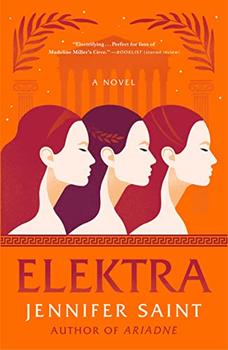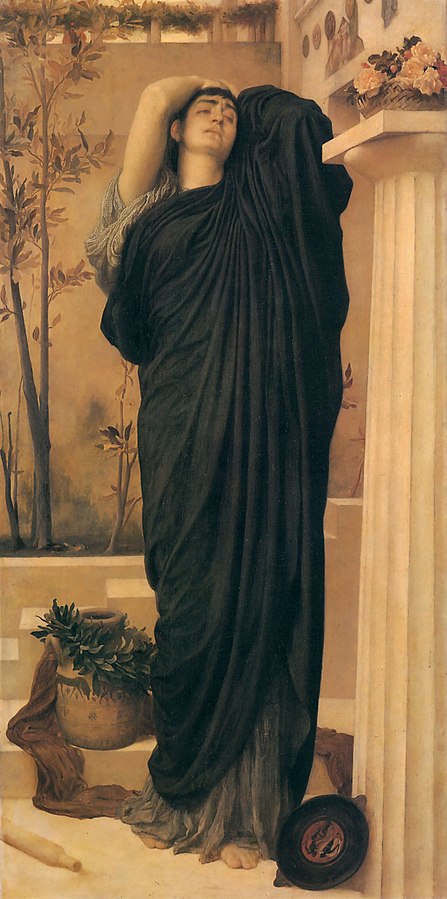Summary | Excerpt | Reading Guide | Reviews | Beyond the Book | Read-Alikes | Genres & Themes | Author Bio

A Novel
by Jennifer SaintThis article relates to Elektra
 We have all heard of the Oedipus complex, right? Its origin is in Greek mythology, where Oedipus, King of Thebes, unknowingly kills his own father and marries his mother. Sigmund Freud introduced the concept of the complex, which posits that a young boy has a subconscious sexual desire toward his mother and anger or jealousy toward his father. Less well-known is the Electra complex, which is essentially the female version of the Oedipus complex, wherein a girl between the ages of three and six is subconsciously sexually attached to her father and increasingly hostile toward her mother. Often mistakenly attributed to Freud, it was his contemporary, Carl Jung, who devised the theory in 1913, drawing from his colleague's hypotheses on the psychosexual stages of development.
We have all heard of the Oedipus complex, right? Its origin is in Greek mythology, where Oedipus, King of Thebes, unknowingly kills his own father and marries his mother. Sigmund Freud introduced the concept of the complex, which posits that a young boy has a subconscious sexual desire toward his mother and anger or jealousy toward his father. Less well-known is the Electra complex, which is essentially the female version of the Oedipus complex, wherein a girl between the ages of three and six is subconsciously sexually attached to her father and increasingly hostile toward her mother. Often mistakenly attributed to Freud, it was his contemporary, Carl Jung, who devised the theory in 1913, drawing from his colleague's hypotheses on the psychosexual stages of development.
Just as the Oedipus complex was named after a Greek myth, so was its obverse. In Greek mythology (spoiler alert!), Electra, the youngest daughter of King Agamemnon and Queen Clytemnestra of Mycenae, seeks revenge upon her mother for the murder of her beloved father. In league with her brother, Orestes, they eventually kill Clytemnestra and her lover. In Jennifer Saint's novel, the young Elektra exhibits signs of hero worship for her father, but thankfully no indications of subconscious libidinal longings are present in this storyline.
Freud and Jung disagreed on whether the Electra complex was its own distinct phenomenon. Indeed, Freud believed young girls could exhibit a "feminine Oedipus attitude" that would later revert to the girl reattaching to the mother out of fear of losing her love. Carl Jung fundamentally disagreed with Freud about a girl's experience at the early stages of psychosexual development, finding a "theoretical vacuum" in Freud's theory since it focused only on boys and the relationships between sons and mothers. Jung therefore formulated the Electra theory to bring the female perspective to that field of development.
Problematic in both complexes is the underlying theory of "penis envy," which Freud notoriously proposed as part of the "phallic stage" of psychosexual development. This antiquated theory is now largely criticized in the fields of psychology and psychoanalysis, debunked as a misogynistic, misplaced understanding of women's bodies and psyches. One clinical worker in private practice said in an interview for Live Science that penis envy is "not used in any kind of lexicon that I'm familiar with in mental health," and went on to suggest that if someone complained of such an affliction, she would assume they were playing a prank.
Whether it is Oedipus or Electra, most contemporary psychologists do not hold these outdated gender development theories in esteem, thank goodness.
Electra at the Tomb of Agamemnon (1869) by Frederic Leighton, courtesy of Wikimedia Commons
Filed under Cultural Curiosities
![]() This "beyond the book article" relates to Elektra. It originally ran in June 2022 and has been updated for the
May 2023 paperback edition.
Go to magazine.
This "beyond the book article" relates to Elektra. It originally ran in June 2022 and has been updated for the
May 2023 paperback edition.
Go to magazine.






Your guide toexceptional books
BookBrowse seeks out and recommends the best in contemporary fiction and nonfiction—books that not only engage and entertain but also deepen our understanding of ourselves and the world around us.